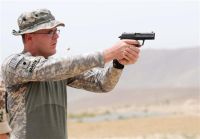CAMP PHOENIX, Afghanistan — Army Spc. John Hanson, who has a form of cerebral palsy, spent 11 years fighting to join the military. He never gave up and now he is a soldier serving in Afghanistan.
Hanson still faces the everyday challenges of cerebral palsy – a condition that can affect brain and nervous system functions such as movement, learning, hearing, seeing and thinking. As a member of the Sioux Falls, S.D.,-based 196th Maneuver Enhancement Brigade, South Dakota Army National Guard, Hanson’s condition doesn’t restrict his ability to perform and support the mission of his unit in Afghanistan.
“When people saw me, they saw something that was not normal and they figured that I was exactly that,” said Hanson, of Sioux Falls. “Instead of finding out what I could do, they assumed I couldn’t do anything – until I proved them wrong.”
As a member of the 196th, Hanson serves as the office manager for the directorate of resource management on Camp Phoenix, which provides construction, commodity and service contract management and funding oversight for 11 military bases in Afghanistan’s capital city of Kabul.
“I am so impressed by John’s determination and dedication to serve,” said Brig. Gen. Theodore Johnson, the 196th’s commander. “He plays an important role in the resource management directorate and it’s an honor having him on the 196th’s team.”
However, Hanson’s journey to being able to serve in Afghanistan was no easy task. During his first attempt to join the National Guard in 1995, he was denied eligibility by a physician at the Military Entrance Processing Station.
Hanson is affected by a specific type of cerebral palsy known as spastic diplegia, a form that impacts the lower extremities with little to no effect to the upper body. Hanson knew it would be difficult to join the military with the physical limitations his condition caused to his legs and feet. However, he was determined to join, and continue the long line of military service within his family.
“I wanted to feel a part of something that is not only a great organization, but also part of my family,” Hanson said. “My father was in the National Guard, my uncle was in the Air Force, one grandfather was a lieutenant in the Army Air Corps, and another served as a Marine. Call it not only a sense of duty and honor, but a way to live up to the example set by the people who surrounded me.”
After being denied by the military doctor, Hanson persisted, and worked with several civilian physicians to improve his mobility and become medically eligible – enduring surgeries and physical therapy – never giving up on his dream.
“After every time I went to MEPS, and I was stopped, I worked at that one roadblock until I found a way to push over it and pass it,” said Hanson. “It took lots of support from family, friends and co-workers. They all knew it was a dream of mine to wear the uniform of the U.S. Army and I was going to do whatever it takes.”
Hanson said his determination to serve also was influenced by veterans in his home community.
“The [American] Legion hall in my small hometown of Badger, S.D., is named after my great-uncle that was lost at sea after the Dec. 7, 1941, attacks,” he said. “Along with that, I grew up surrounded by the World War II veterans in town; the stories and the camaraderie was another big driving force to be a part of the military.”
Finally, in 2006, Hanson was able to join the ranks of the South Dakota Army National Guard by working with his two civilian physicians and the MEPS doctor. Hanson’s doctors were able to prove he was medically fit for duty, and eventually, the initial medical disqualification was overturned.
“I can not speculate how [my doctors] came to their reasoning. I think the fact that they have known me and have been a witness of the progress and achievements I have made my entire life might have had something to do with it,” Hanson said.
“Let’s just say the feeling I had when I graduated from South Dakota State University after four years was nothing compared to the feeling the day I went to MEPS and took my oath of enlistment,” he added.
Along with serving in the National Guard, Hanson also works back home in Sioux Falls as a firefighter, paramedic and a rescue scuba diver.
“Specialist Hanson is always upbeat and ready to do whatever needs to be done,” said Army Sgt. 1st Class Paul Carroll, a member of the 196th. “When working with others he knows how to keep things fun and yet still get our job done to the highest standard.”
“I think the only issues I really had [with people,] was them ‘judging a book by its cover,’ ” Hanson said. “I’m just glad to show them that no matter what, if you put your mind to it and work at it, any dream can come true.”
Source:
U.S. Department of Defense
Office of the Assistant Secretary of Defense (Public Affairs)

 von
von 

